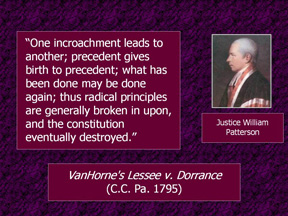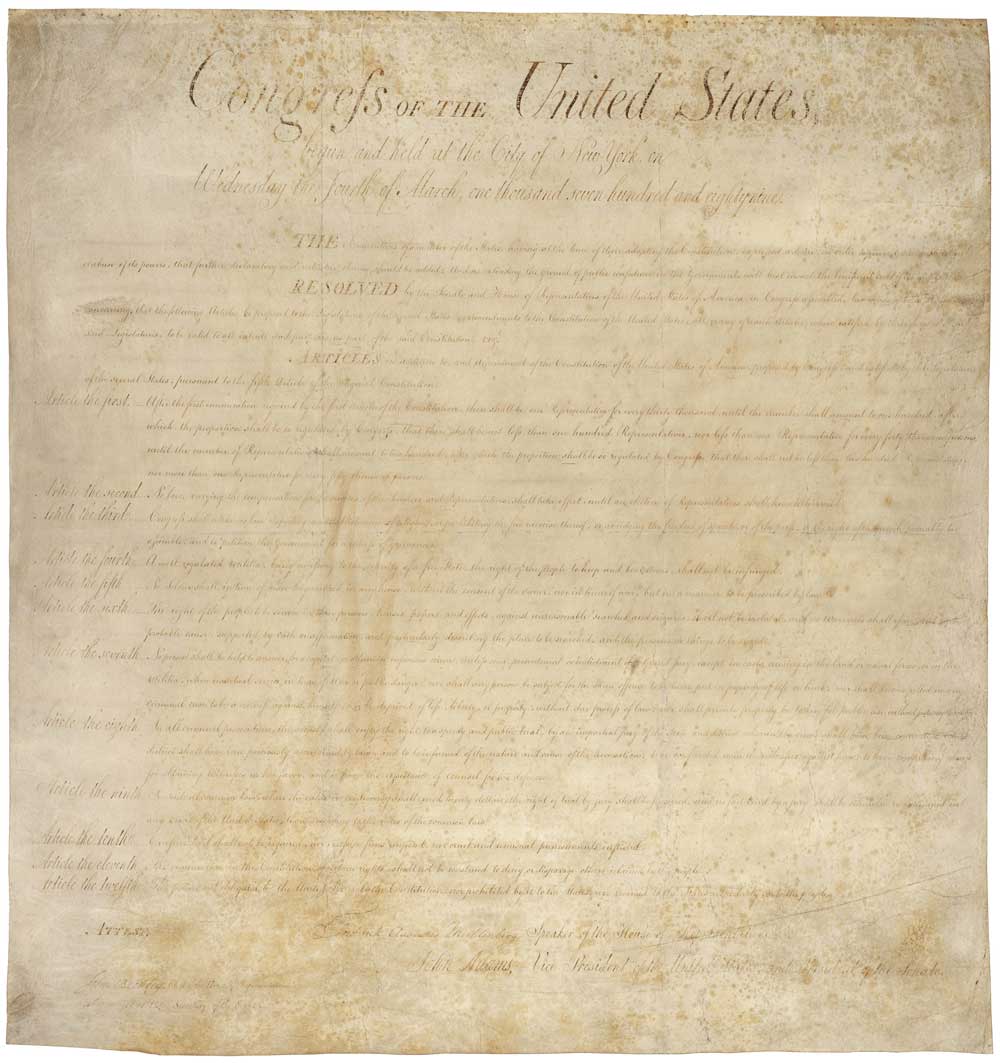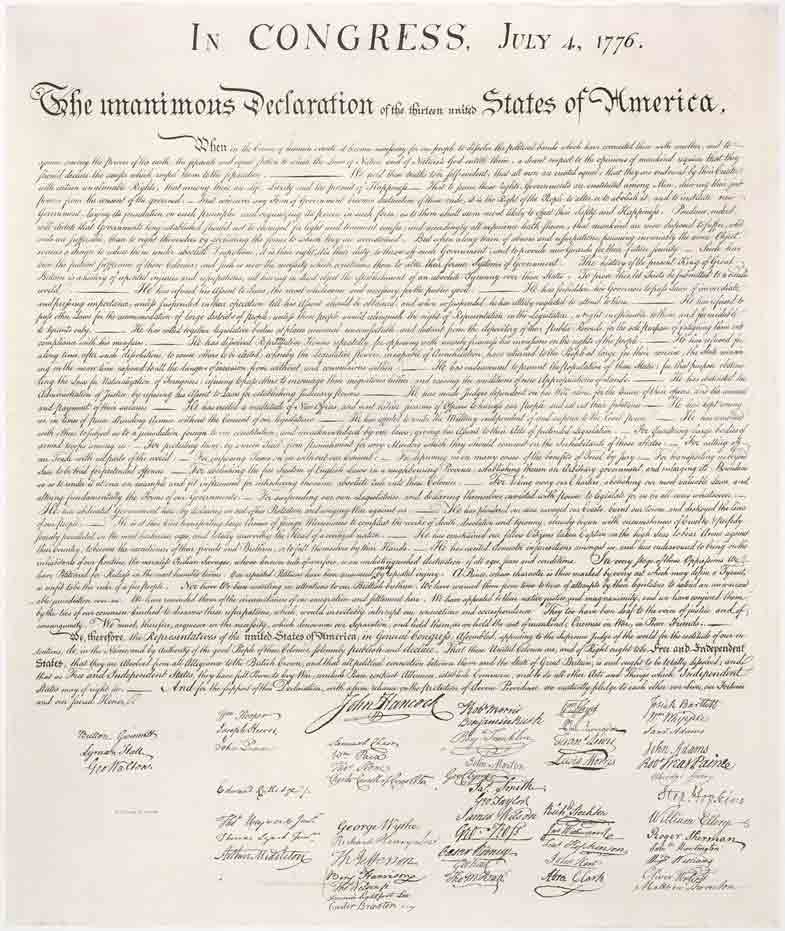Unalienable vs. Inalienable Rights
|
Original Bill of Rights (Left Image) And Declaration of Independence (Right Image) |
"We hold these truths to be self-evident, that all men are created equal, that they are endowed by their Creator with certain unalienable rights, that among these are Life, Liberty and the pursuit of Happiness." Declaration of Independence, 2nd para.
"The enumeration in the Constitution, of certain rights, shall not be construed to deny or disparage others retained by the people." Amendment IX, U.S. Constitution Bill of Rights, i.e. framers recognized other rights that preceded the constitution, rights inherent in Anglo American Common Law and in natural law.
"Jefferson's original draft of this phrase in the Declaration of Independence was written: "We hold these truths to be sacred and undeniable; that all men are created equal and independent, that from that equal creation they derive rights inherent and inalienable, among which are the preservation of life, liberty and the pursuit of happiness.
Members of the Declaration committee of the Continental Congress that had been selected to write the document included Benjamin Franklin and John Adams who had different beliefs. The word "inalienable" was changed to "unalienable" and read: "We hold these truths to be self-evident, that all men are created equal, that they are endowed by their Creator with certain unalienable rights, that among these are Life, Liberty and the Pursuit of Happiness."
The above two paragraphs come from Mary Mostert in an article she wrote on January 11, 2006 "Unalienable vs. inalienable rights". She explains the change; as Thomas Jefferson reflected a Deist philosophy and did not believe in a loving and caring Heavenly Father vs. the 18th century version of "intelligent design" reflected by Franklin and Adams.
| "You cannot surrender, sell or transfer unalienable rights, they are a gift from the creator to the individual and cannot under any circumstances be surrendered or taken. All individual's have unalienable rights" |
| "You can surrender, sell or transfer inalienable rights if you consent either actually or constructively. Inalienable rights are not inherent in man and can be alienated by government. Persons have inalienable rights. Most state constitutions recognize only inalienable rights." |
| Black's Law Dictionary Definition, Fifth Edition |
"Unalienable: Inalienable; incapable of being alienated, that is, sold and transferred." Page 1366 "Inalienable rights. rights which can never be abridged because they are so fundamental." |
| "Inalienable rights. Rights which are not capable of being surrendered or transferred without the consent of the one possessing such rights. Morrison v. State, Mo.App., 252 S.W. 2d 97, 101." Page 683 |
"It has been well said, by one of the ablest judges of the age, that a "constitution is not to receive a technical construction, like a common law instrument or a stature. It is to be interpreted so as to carry out the great principles of the government, not to defeat them." Per Gibson, C.J. in Commonwealth v. Clark, 7 Watts & S. (Pa.), 133. Butler V. Com. of Pennsylvania, 51 U.S. 402 (1850)
"The very highest duty of the States, when they entered into the Union under the Constitution, was to protect all persons within their boundaries in the enjoyment of these "unalienable rights with which they were endowed by their Creator.", U.S. v. Cruikshank, 92 U.S. 542 (1875)
"....The first ten amendments to the Constitution, adopted as they were soon after the adoption of the Constitution, are in the nature of a bill of rights, and were adopted in order to quiet the apprehension of many, that without some such declaration of rights the government would assume, and might be held to possess, the power to trespass upon those rights of persons and property which by the Declaration of Independence were affirmed to be unalienable rights. United States v. Twin City Power Co., 350 U.S. 222 (1956)"
Above quotes from https://www.gemworld.com/USA-Unalienable.htm
"The traditional American philosophy teaches that Man, the Individual, is endowed at birth with rights which are unalienable because they are given by his Creator. This governmental philosophy is uniquely American. The concept of Man's rights being unalienable is used solely upon the belief in their Divine origin. Lacking this belief, there is no moral basis for any claim that they are unalienable or for any claim to the great benefits flowing from this concept.
God given rights are sometimes called Natural Rights - those possessed by Man under the Laws of Nature, meaning under the Laws of God's creation and therefore by gift of God. Man has no power to alienate - to dispose of by surrender, barter or gift - his God given rights, according to the American philosophy. This is the meaning of "Unalienable.
An Endless List of Rights - To attempt to name all these rights starting with "Life, Liberty and the pursuit of Happiness", mentioned in the Declaration of Independence would be to start an endless list which would add up to the whole of Man's Freedom from Government over Man. They would add up to the entirety of Individual Liberty (Liberty against Government over Man).
* FreedomForAllSeasons has created this "endless list" and they now total 70 some unalienable rights and counting - YOUR CERTAIN ENUMERATED UNALIENABLE RIGHTS (Revision 11)
Innumerable rights of the Individual embraced in the Ninth Amendment, which states; "The enumeration in the Constitution of certain rights shall not be construed to deny or disparage others retained by the people.
Freedom of Choice - Some idea of how vast the list would be is indicated by just one general freedom which leads into almost all of Free Man's activities of daily living through out life; freedom of choice. This term stands for the right to do and equally not do this or that, as conscience, whim or judgment, taste or desire of The Individual may promp.......for as long as life lasts; but always, of course, with due regard for the equal rights of others and for the just laws expressive of .."just powers" of government designed to help safeguard the equal rights of all individuals. Spelled out in detail, this single freedom - freedom of choice - is almost all embracing.
Right To Be Let Alone - In one sense, such freedom to choose involves Man's right to be let alone, which is possessed by The Individual in keeping with the Declaration and Constitution as against government; in enjoyment of his unalienable rights, while respecting the equal rights of others and just laws...This right to be let alone is the most comprehensive of rights and the right of most prized by civilized men. This right is, of course, also possessed as against all other individuals, all obligated to act strictly within the limits of their own equal rights. Consequently any infringement of any Individual's rights is precluded.
Neither government nor any Individuals, acting singly, or in groups, or in organizations, could possibly possess any "just power" (to use again the significant term of the Declaration) to violate any Individual's God given, unalienable rights or the supporting rights.
No government can abolish or destroy, nor can it rightfully, or constitutionally, violate Man's God given rights.
- Government cannot justly interfere with Man's deserved enjoyment of any of these rights.
- No public official, nor all such officials combined, could possibly have any such power morally.
- Government can, to be sure, unjustly and unconstitutionally interfere by force with the deserved enjoyment of Man's unalienable rights.
- It is, however, completely powerless to abolish or destroy them.
- It is in defense of these rights of all Individuals, in last analysis, that the self governing people, acting in accordance with, and in support of, the Constitution, oppose any and all violators, whether public officials or usurpers, or others.
Quotes from The American Ideal of 1776, Hamilton Abert Long, 1976 - https://www.lexrex.com/
"Immediately apparent from the Declaration is a recognition of the laws of nature and of nature's God. This speaks of fixed, uniform and universal rules of action established by God. The laws of nature and of nature's God are the source of the unalienable rights of mankind. Civil governments are bound to secure those rights, including property." - https://www.lonang.com/curriculum/2/s21d.htm
"That all men are by nature equally free and independent, and have certain inherent rights, of which, when they enter into a state of society, they cannot, by any compact, deprive or divest their posterity; namely, the enjoyment of life and liberty, with the means of acquiring and possessing property, and pursuing and obtaining happiness and safety" - June 12, 1776, Bill of Rights of the Constitution of Virginia
That, coupled with the Declaration's presupposition that governments are instituted to secure, not to hamper, men's rights, would suggest that some constitutional limitation upon the power of government, including the power of the federal government, against interference with the right to contract, would be consistent with the principles of the Declaration. However, the Declaration does not provide the gauge for judging the scope intended for the particular words chosen for the Contract Clause." - https://www.lonang.com/curriculum/3/s34.htm
Such a limitation on government would also be consistent with what may be called a Biblical model. That model begins with God as the Creator of all things and, therefore, Lord over all Creation. It recognizes that man is created in the image of God, and that man thus owes his very existence to God and has a duty to honor and obey God.It recognizes what might be termed the Creation Mandate - God's command to man to be fruitful, multiply, fill the earth and take dominion over all of its resources, all to God's glory." - https://www.lonang.com/curriculum/3/s34.htm
Government by consent is an unalienable right because it is given by God to all human beings. Consequently, this right is beyond the authority or jurisdiction of any government, federal or otherwise, to impair by regulation, balancing or otherwise. The independent agency, on the other hand, is a statutory creation of the federal government. I suggest that the independent agency, as we know it today, is repugnant to the Constitution. Of more significance to those who live under the reign of such agencies, their creation and continuation is antithetical to the spirit of a free people. - https://www.lonang.com/foundation/4/f44a.htm
"Because the drafters of the Constitution had been faithful to the principles of the Declaration, Adams believed the Constitution would prove itself to be for the people as Mount Gerizim.
|
Adams' closing admonition urged his fellow citizens to adhere to the principles of the Declaration "as to the cords of your eternal salvation." Were he speaking today he would modify his admonition to urge them to return to those principles so that "your children's children [at the Tri-Centennial celebration of the Constitution may] celebrate it again in the full enjoyment ... of all the blessings promised to the children of Israel upon Mount Gerizim, as the reward of obedience to the law of God. Let it be so." - https://www.lonang.com/curriculum/3/s34.htm#8
Quoted from The Laws of Nature And Nature's God - https://www.lonang.com
"From these passages it is evident; that the right of acquiring and possessing property, and having it protected, is one of the natural, inherent, and unalienable rights of man.
U.S. Supreme Court Justice Vanhorne's statement after reading the 1st,
8th and 11th articles of the Declaration of Rights and 9th and 46th |

Credit to Washington Supreme Court Justice Sanders Presentation
"One encroachment leads to another; precedent gives birth to precedent; what has been done may be done again; thus radical principles are generally broken in upon, and the constitution eventually destroyed. Where is the security, where the inviolability of property, if the legislature, by a private act, affecting particular persons only, can take land from one citizen, who acquired it legally, and vest it in another. the rights of private property are regulated, protected, and governed by general, known, and established laws; and decided upon, by general, know, and established tribunals; laws and tribunals not made and created on an instant exigency, on an urgent emergency, to serve a present turn, or the interest of a moment." - https://press-pubs.uchicago.edu/founders/documents/v1ch16s24.html
"What God hath given, man cannot take" Unknown source
"All the wonderful rights God gave you are called “unalienable Rights” in the Declaration of Independence, so whose idea was it to put them to a vote? The assembly of lawyers and other scoundrels otherwise known as the Constitutional Convention knew the “unalienable Rights” of the Declaration of Independence stood in the way of a strong central government. The so-called Founding Fathers dispensed with them by making them subject to the mob democracy." |
Click on Your hat and saddle to ride on Home partner
Compiled by Jackranch
The Ranch at Freedom For All Seasons BARJRV
jacksranch at freedomforallseasons dot org


